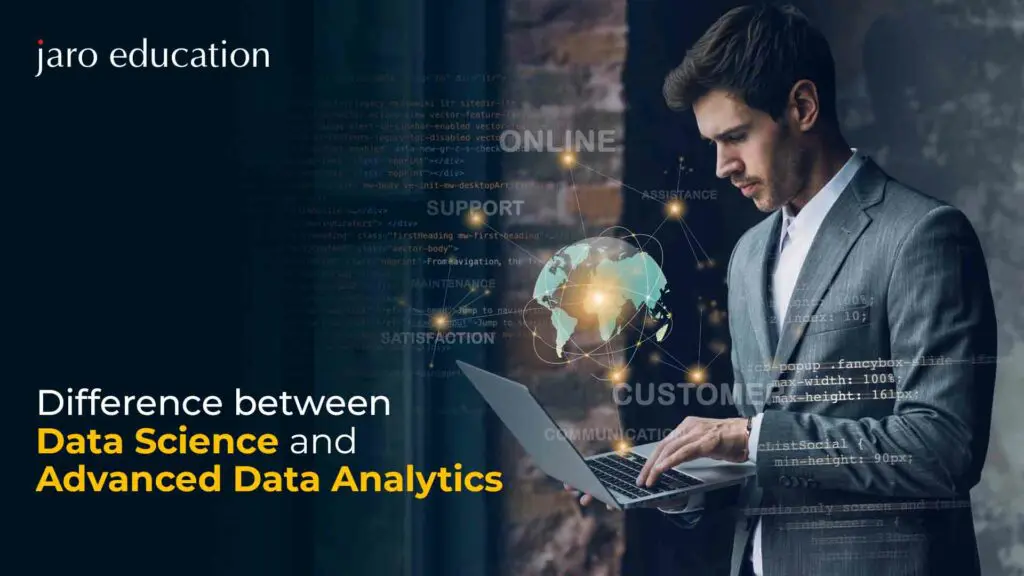Data Science and Advanced Data Analytics form two interrelated domains involved in extracting valuable insights from data. Despite their similarities, they possess distinctive characteristics. Let’s look into the specifics and features of data Science and advanced data analytics, demonstrating their distinct characteristics and contributions to the field of data analysis.
To improve your proficiency in data science and advanced analytics, you can join the esteemed PG Certificate Programme in Advanced Analytics & Business Intelligence – IIM Kozhikode. The meticulously crafted curriculum is designed to enhance data-driven decision-making capabilities while minimising any interference with professional commitments. Embrace this opportunity to upskill and empower yourself with the latest tools and techniques in the field.
What is Data Science?
Data science is an interdisciplinary subject that amalgamates techniques and methodologies from diverse domains like statistics, mathematics, computer science, and domain knowledge. Its purpose is to extract knowledge and insights from structured and unstructured data. In data science, descriptive and predictive analyses are employed to unearth patterns, trends, and correlations within data. It also constructs the models for predictive purposes and informed decision-making. This discipline frequently leverages machine learning algorithms and statistical models to extract meaningful information from intricate datasets.
The field of data science is not limited to a single industry or domain. It finds applications in a wide range of areas, including finance, healthcare, marketing, and more. By employing advanced analytical techniques, data science enables businesses to uncover hidden opportunities, optimise processes, and enhance their overall performance.
Uses of Data Science
Data science possesses a remarkable capability to unravel intricate patterns hidden within seemingly unrelated data, thus empowering the extraction of profound conclusions and insightful predictions.
- In technological enterprises, those who acquire user data have the potential to employ ingenious strategies to metamorphose such data into invaluable or even highly lucrative information.
- Remarkable advancements have been made through data science in the transportation industry, particularly within the sector of autonomous vehicles. The integration of driverless cars streamlines the intricate process of mitigating the occurrence of accidents. Notably, these self-driving vehicles are equipped with vast training data, which are analysed through scientific methodologies. This analysis encompasses various factors, ranging from the speed limits on highways to the urban landscapes.
- The application of data science serves as a catalyst for achieving an elevated level of personalised therapy through groundbreaking research in the fields of genetics and genomics. Genomic variant calling and bioinformatics are only a couple of fields associated with genetics and genomics that leverage data science to enhance studies and findings.
- Image recognition can be facilitated by utilising data science. For instance, when we provide an image to Facebook with a friend, Facebook suggests tagging who is in the picture. This is accomplished through the use of machine learning and data science. When an image is recognised, data analysis on one’s Facebook friends’ is performed. If the faces in the photo match someone else’s profile, Facebook recommends auto-tagging.
- Data science is also helping the airline industry develop since it makes it easier to foresee flight delays. It also facilitates revenue management by analysing historical booking data, market conditions, and customer behaviour. Route optimisation and risk management are also possible by incorporating data science tools.
- Several logistics organisations such as DHL, FedEx, and others use data science to determine the optimum route for product shipment, the best time for delivery, the best method of transportation to reach the location, and so on.
- The AutoComplete tool is an important aspect of Data Science since it allows users to write a few letters or words and have the line auto-complete. When composing a formal email to someone, the data science notion of Autocomplete is applied. The AutoComplete feature is frequently used in search engines, social media, and numerous apps.
What is Advanced Data Analytics?
Advanced data analytics is a subset of data science that particularly concentrates on utilising advanced analytical techniques to derive insights and facilitate decision-making. Advanced analytics encompasses the exploration of data to identify patterns, trends, and anomalies while also fostering the development of models to predict future outcomes or optimise processes.
Differing from data science, which possesses a broader scope, advanced data analytics is more specialised and centres around the development and application of advanced analytical models and algorithms. Mastery of statistical analysis, machine learning, and data visualisation techniques is crucial in this field.
Uses of Advanced Data Analytics
Advanced analytics equip firms with data analytic approaches that can deliver a variety of benefits when confronted with regular business difficulties. Advanced analytics can help firms navigate changing market dynamics by assisting them in making better business decisions, predicting future trends, and identifying risks.
- Business Intelligence (BI) harnesses the capabilities of advanced data analysis techniques to unlock the untapped potential of raw information. By delving deep into the intricate complexities of data, BI empowers organisations to unravel intricate patterns and detect emerging trends. It also supports making astute data-driven decisions to optimise strategies and enhance overall performance.
- One of the major obstacles in the banking industry is fraudulent transactions in which a person or a company withdraws funds that are not their own. Numerous banks now utilise advanced analytics techniques such as predictive detection and robotic process automation (RPA) to identify possible fraudulent transactions that take place. Such advanced data analytics tools are highly sophisticated and can also be used in industries other than banks to detect fraudulent activities.
- With the help of advanced data analysis techniques, businesses can seamlessly divide their customer base into distinct groups characterised by demographics, behaviours, preferences, or purchasing patterns. Through this alchemical process, organisations gain the power to tailor their marketing strategies, shape their product offerings, and craft personalised customer experiences.
- Risk is an unavoidable part of running a business or starting a new venture, whether it is the launch of a new item or the development of a marketing strategy. Advanced data analysis serves as a guiding light in this domain of risk, effectively directing organisations securely across dangerous situations. By analysing large volumes of data, along with identifying patterns and trends, data analytics tools can help in managing and mitigating risks.
- From the field of e-commerce to streaming services and social media platforms, it always resonates with the desires and preferences of each individual user. By meticulously analysing user behaviour, preferences, and past interactions, these algorithms provide enhanced personalised experiences, offering precisely tailored recommendations t. Whether it’s suggesting the perfect product, recommending a captivating movie, or presenting engaging content, the power of advanced data analysis enriches user satisfaction and drives heightened engagement.
- In supply chain management, data science acts as a great resource to optimise inventory levels, streamline logistics, and drive cost reductions. In the manufacturing sector, data analysis serves as a guiding compass, optimising production schedules and enhancing overall operational efficiency. Through advanced data analysis, organisations unlock the potential to achieve peak performance and drive continuous improvement.
Comparing Data Science and Advanced Data Analytics
Data science and advanced data analytics are two distinct fields that are essential in extracting insights from data to solve business problems. Here is a comparison between the two:
Scope
- Data science is a multidisciplinary field encompassing statistical research, mathematics, machine learning, data analytics, and computer science. It has a macro scope involving machine learning, artificial intelligence, and algorithm development.
- Advanced data analytics has a narrower scope focused on analytical methods and techniques using statistical tools. It primarily deals with organising, processing, and analysing business information.
Job Opportunities and Pay
- Data science offers some of the highest-paying jobs in the IT industry, thanks to its broader skill set and involvement in cutting-edge technologies.
- While data analytics also leads to lucrative career opportunities, professionals in this field generally receive lower compensation than data scientists.
Skills Required
- Data analysts need to have a good understanding of SQL and other databases, along with programming skills in tools like Spark/Hadoop, R/Python, and more.
- Data scientists should possess knowledge of data modelling, machine learning, advanced statistics, and other related concepts. They typically work with languages such as Python/R, SQL, and SAS.
Data Handling
- Data analysts usually work with structured data received from various sources. They apply data visualisation techniques and design principles to analyse and present the data.
- Data scientists, on the other hand, deal with raw and unstructured data. They clean and organise the data to prepare it for analysis.
Problem-solving Approach
- In advanced data analytics, analysts work with predefined issues and use analytics to find relevant solutions for those issues.
- Data science involves exploring new and undiscovered business problems. Data scientists dig deep into data to uncover innovative use cases and develop compelling business stories.
Application Areas
- Data analytics finds dominant usage in industries such as travel and tourism, finance, healthcare, gaming, and more.
- Data Science is applied in diverse areas like internet research, speech recognition, image recognition, recommender systems, and digital marketing, among others.
Career Perspective
- Data science is typically a more technical field, requiring a mathematical mindset, while data analysts adopt a statistical and analytical approach. From a career perspective, data analyst roles are more entry-level positions, and candidates with a strong background in statistics and programming can secure these jobs.
- Recruiters often prefer data analyst candidates with 2-5 years of industry experience. On the other hand, data scientists are seasoned experts with over ten years of experience.
Qualification
- Qualifications for a data scientist typically include a strong foundation in mathematics and statistics, proficiency in programming languages like Python or R, and knowledge of machine learning algorithms and data visualisation techniques. Additionally, data scientists often possess advanced degrees such as a Master’s or PhD in a relevant field.
- Qualifications for advanced data analytics may include a Bachelor’s or Master’s degree in fields like statistics, mathematics, computer science, or business analytics.
Wrapping Up
Data science and advanced data analytics are two interconnected fields that share common goals but differ in their scope, depth, and specialisation. Data science encompasses a broader range of techniques and methodologies, while advanced data analytics focuses specifically on the application of advanced analytical techniques. Both fields play a crucial role in extracting insights and value from data, driving decision-making, and enabling data-driven innovation in various industries.
Enhance your expertise in advanced analytics through enrollment in the PG Certificate in Advanced Analytics and Business Intelligence Programme by IIM Kozhikode. This comprehensive course on data science and advanced analytics will help you to acquire invaluable skills in this rapidly evolving field. Engage in peer networking opportunities spanning diverse sectors and cultivate proficient leadership abilities within this esteemed program. Register for this programme through Jaro Education’s platform to manifest a bright future in the field of data science and advanced analytics.





